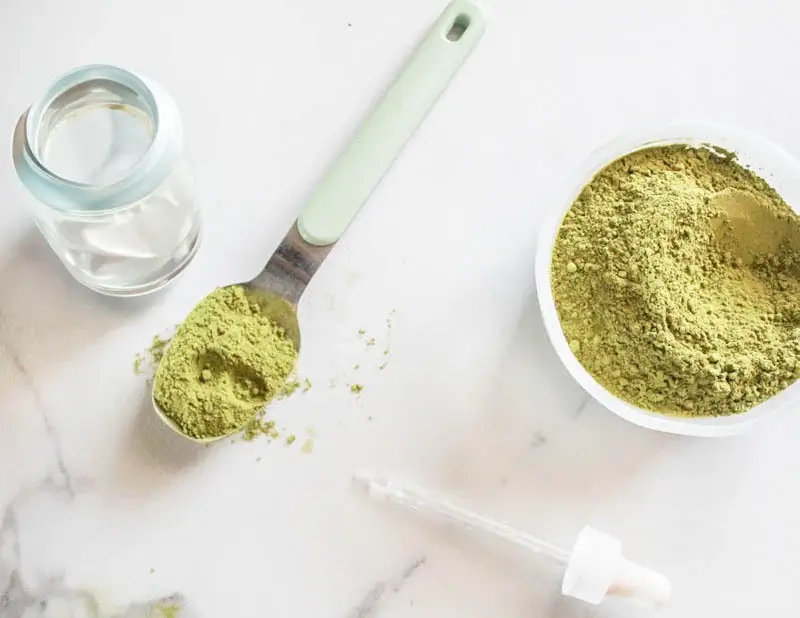Understanding how to improve insulin resistance could be the key to unlocking better health in a myriad of unexpected areas. If you’re dealing with stubborn weight gain, high blood pressure, or cholesterol issues, there’s a good chance insulin resistance is at the root of it.
🎙️ Ever wonder what really causes insulin resistance? I sat down with Dr. Cyrus Khambatta to get the truth—and it may surprise you. Listen to our full Natural Living Family podcast episode here.
It’s a silent but widespread condition that disrupts your body’s ability to manage energy properly, leading to a cascade of chronic health problems.
The good news? With the right natural strategies and a renewed understanding of how your body works, you can improve, or even reverse insulin resistant status and begin to reclaim your health naturally.
Table of Contents
What Is Insulin Resistance? What Is Insulin Sensitivity?
Insulin is a hormone produced by your pancreas that acts like a key, unlocking your cells to allow glucose (sugar) from your bloodstream to enter and be used for energy. But when your cells are exposed to excess energy – especially from high-fat, high-sugar diets – they start resisting insulinʼs signal. This condition is called insulin resistance.
In people with insulin resistance, their muscle, fat, and liver cells donʼt respond properly to insulin. This can make blood sugar levels rise, and the pancreas to go into overdrive, pumping out more insulin to compensate. Which in turn, leads to hyperinsulinemia or elevated blood insulin levels. If left unaddressed, insulin resistance can progress to prediabetes, and people with prediabetes may develop type 2 diabetes.
By contrast, insulin sensitivity refers to how efficiently your cells respond to insulin. When you’re insulin sensitive, only a small amount of insulin is needed to move glucose out of the bloodstream and into your cells. This helps maintain stable blood sugar levels and reduces stress on your pancreas.
How Are Insulin Resistance and Insulin Sensitivity Related?
Insulin resistance and insulin sensitivity are two sides of the same coin.
When insulin sensitivity is low (meaning you have insulin resistance), your cells donʼt respond as well, so your body needs to produce more insulin to keep blood sugar in check. Over time, this can lead to higher insulin and blood sugar levels, and eventually to prediabetes or type 2 diabetes if not addressed.
But the encouraging news is this… insulin resistance is reversible. You can restore insulin sensitivity through lifestyle choices like:
- Eating a whole-food, plant-strong diet
- Exercising regularly
- Managing stress
- Reducing toxic exposures
There are factors for insulin resistance you can take into account. These include a wide range of lifestyle, medical, and genetic factors. One of the most well-documented contributors is excess body weight, especially around the abdomen. This type of visceral fat surrounds your organs and interferes with the way insulin works. Other risk factors include a sedentary lifestyle, diets high in processed foods and added sugars, advancing age, and family history of diabetes or PCOS. Women with a history of gestational diabetes or who have given birth to large babies are also at higher risk.
Certain ethnic backgrounds are at higher risk for insulin resistance, including African American, Hispanic, Native American, Pacific Islander, and Asian American. They may want to be more intentional about avoiding things that lead to an insulin resistant state. Smoking, exposure to endocrine-disrupting chemicals, chronic stress, and poor sleep can further increase the risk of insulin resistance.
Understanding these risk factors empowers you to make targeted, preventive choices that support long-term wellness. When your cells become more insulin sensitive, your blood sugar stabilizes, your energy improves, and your risk for chronic disease dramatically decreases. It’s a core step in restoring the vibrant health God designed you to enjoy.
Why Insulin Resistance Matters: Ten Linked Health Conditions
Insulin resistance (IR) is a metabolic dysfunction that disrupts the bodyʼs ability to regulate blood sugar, lipids, and inflammation. Over time, IR creates a cascade of interconnected conditions, often termed a “constellation of chronic diseases” by experts like Dr. Cyrus Khambatta. We see this with metabolic syndrome when people have high blood pressure, high blood sugar and more.
Most people donʼt just experience one health challenge—theyʼre facing clusters of symptoms like high A1C, high LDL cholesterol, hypertension, weight gain, fatigue, and more. And in many of these cases, insulin resistance is the silent, underlying factor connecting them all.
Complications from Insulin resistance affect nearly every system in your body. When your cells stop responding to insulin properly, the results can ripple outward in damaging ways.
Hereʼs how complications of insulin resistance contribute to ten major health conditions:
1. Type 2 Diabetes and Prediabetes
Insulin resistance is the primary cause of blood sugar spikes. And the development of prediabetes and type 2 diabetes. As insulin becomes less effective, the body struggles to manage glucose, leading to chronically high blood sugar levels.
2. High Blood Pressure and Abnormal Cholesterol Levels
Insulin resistance is strongly associated with hypertension and dyslipidemia (elevated LDL cholesterol, high triglycerides, and reduced HDL cholesterol), all of which increase the risk of cardiovascular disease.
3. Cardiovascular Disease and Atherosclerosis
We know that insulin resistance promotes inflammation, impairs blood vessel function, and disrupts lipid metabolism, significantly raising the risk of heart attack, stroke, and other cardiovascular events.
4. Non-Alcoholic Fatty Liver Disease (NAFLD)
By encouraging fat storage in the liver, IR leads to Non-Alcoholic Fatty Liver Disease (NAFLD). This may progress to more serious liver inflammation and damage (non- alcoholic steatohepatitis or NASH).
5. Polycystic Ovary Syndrome (PCOS)
In women, insulin resistance is a major factor behind PCOS, contributing to hormonal imbalances, menstrual irregularity, acne, and female infertility.
6. Obesity and Central Adiposity
Insulin resistance both results from and promotes excess body fat accumulation, especially around the midsection. This type of visceral fat is particularly harmful and contributes to ongoing hormonal and metabolic disruption.
7. Metabolic Syndrome
The core issue in metabolic syndrome—a group of conditions including high blood pressure, high blood sugar, excess abdominal fat, and abnormal cholesterol levels – is insulin resistance. Together, these dramatically raise the risk of diabetes and heart disease.
8. Cognitive Decline and Alzheimerʼs Disease
Insulin resistance affects how the brain uses glucose, increasing the risk for memory loss and dementia. Alzheimerʼs is increasingly referred to as “Type 3 Diabetes” because of its strong metabolic link. Management of insulin resistance can literally help to preserve your brain health!
9. Kidney Damage (Nephropathy)
Even before diabetes is formally diagnosed, your insulin resistant status can harm kidney function, increasing the risk for chronic kidney disease and eventual kidney failure.
10. Nerve Damage (Neuropathy)
Insulin resistance is associated with both peripheral and autonomic neuropathies, causing symptoms like pain, numbness, tingling, digestive issues, and poor circulation.
Some studies are even beginning to suggest a link between insulin resistance and certain cancers, which makes it even more important to understand and manage IR for ourselves and our loved ones.
But hereʼs the truth: this isnʼt just about avoiding disease. Itʼs about living the full, abundant life God has for you.
“The thief comes only to steal and kill and destroy; I have come that they may have life, and have it to the full.” (John 10:10)
Ten Ways to Improve Insulin Sensitivity Naturally
Management of insulin resistance begins with daily choices. Here are ten research-backed, biblically aligned steps to help restore your bodyʼs insulin sensitivity.
1. Adopt a Whole-Food, Plant-Predominant Diet
A balanced diet rich in vegetables, whole grains, legumes, berries, nuts, seeds, and other bioactive foods supports healthy blood sugar and metabolic healing. Fiber, antioxidants, and healthy fats found in these foods help your cells respond better to insulin and reduce inflammation
- Leafy Greens and Cruciferous Vegetables – High in magnesium and fiber, cruciferous vegetables support detoxification, blood sugar regulation, and insulin function.
- Whole Grains Like Quinoa and Brown Rice – Complex carbohydrates such as those found in the superfood quinoa offer slow-release energy, help balance blood sugar, and fuel beneficial gut bacteria.
- Beans, Lentils, and Legumes – Packed with protein, fiber, and resistant starch, to help slow glucose absorption and promote feeling satiated.
- Berries and High-Antioxidant Fruits – Blueberries, strawberries, and raspberries lower oxidative stress and inflammation.
- Flax, Chia, and Avocado – Rich in Omega-3 fatty acids to support hormone balance and metabolic function. Learn more about flax seed benefits, how chia seeds improve health, and why we consider avocado a superfood.
Explore detailed recipes that incorporate the health benefits of these foods using Mama Z’s delicious twists in our Natural Living Family recipes.
2. Exercise Regularly
Movement is medicine for insulin sensitivity. Whether itʼs gentle aerobic exercise like walking around the block, dancing in your kitchen, or doing light yoga, start with regular exercise wherever you are. Any physical activity increase will be a benefit.
High-Intensity Interval Training (HIIT) is particularly effective; see our HIIT for Beginners post for a simple start. Support exercise recovery by using essential oils like peppermint and other athletic-friendly EO blends we like.
3. Maintain a Healthy Weight
You donʼt need to drop dozens of pounds overnight or lose excess weight with crazy fad diets. Even a 5-10% weight loss can significantly improve insulin function. Support your journey with:
- Natural Weight Loss Tips for holistic, sustainable results
- Essential Oils for Weight Management
- Recipes designed to nourish without added sugars or processed ingredients. You lose extra weight and eat amazing, delicious meals at the same time.
4. Stay Hydrated
Hydration is key for metabolic function, but sugary beverages hurt more than they help.
Try these healthy, sugar-free options instead:
5. Limit Refined Carbohydrates and Added Sugars
Swap white sugar and refined grains for nutrient-dense alternatives. All our Natural Living Family Recipes are free from refined sugar! Learn more from our Natural Sweeteners Guide and Stevia Benefits post so you can help keep how you use sugar in check.
6. Consider Intermittent Fasting or Time-Restricted Eating
When done properly, intermittent fasting can help lower insulin levels and improve metabolic health. Eating within an 8-10 hour window may help lower insulin levels . Start slowly and listen to your bodyʼs cues and see our Intermittent Fasting Guide to help you get started.
7. Reduce Exposure to Endocrine Disruptors
Toxic chemicals in your home may interfere with insulin function. Endocrine exposures and hormonal disorders can be a hidden cause of so many health problems. Start detoxing your home with some of these simple swaps:
- Body Care Products: Choose essential oil-based lotions, deodorants, and shampoos to avoid body care products with toxic ingredients.
- Cleaning Products: Avoid chemicals that put your heart and health at risk by looking for (or creating) household cleaners without these top harmful chemicals.
- Cookware: Our report about non-toxic cookware is a great place to start when minimizing your exposure levels.
8. Support Gut Health
A healthy gut microbiome is linked to better insulin sensitivity. To boost your microbiome:
- Eat prebiotic foods like onions, garlic, and asparagus.
- Include fermented foods like kefir, sauerkraut, kimchi (you can make your own!), and coconut yogurt
- Add Essential Oils for Gut Health and quality probiotics to your health routine.
- Consider digestive enzymes, especially when transitioning to a plant-rich diet
9. Manage Stress Levels & Emotional Health
Chronic stress elevates cortisol, which directly worsens insulin resistance. Build emotional resilience through:
- Biblical Affirmations & Healing Words
- Self-Love and Emotional Healing
- Essential Oils for Stress & Anxiety
10. Establish Healthy Sleep Cycles
Aim for 7-9 hours of quality sleep each night. Poor sleep can impair insulin sensitivity and increase your risk for metabolic issues.
- Use Essential Oils for Sleep
- Try Wholetones Healing Music for a calming bedtime environment
- Keep a consistent schedule and reduce blue light exposure before bed
For additional support, explore our Essential Oils for Metabolic Syndrome post. These strategies can work together to help you take back your health, naturally and prayerfully.
Prioritize Sustainable, Long-Term Choices
While keto and carnivore diets can sometimes lead to short-term weight loss or temporary improvements in blood sugar, research shows that these high-fat approaches may actually worsen insulin resistance and raise LDL cholesterol over time. Ultimately, real, lasting health comes from sustainable lifestyle changes, not quick fixes or extreme restrictions.
The key in how to improve insulin resistance naturally?
Make your plate colorful, fiber-rich, and joy-filled. Choose foods that bless your body and your soul. And when in doubt, lean on God’s wisdom and nature’s bounty.
Minimize the harmful load on your body through wise consumer choices, and increase your physical activity—starting wherever you are right now. Every small, positive step counts.
Remember, this isnʼt about perfection or rigid rules. Itʼs about honoring your body as a temple of the Holy Spirit (1 Corinthians 6:19-20) and making intentional choices that lead to life and wholeness.
“Beloved, I pray that you may prosper in all things and be in health, just as your soul prospers. (3 John 1:2)
-
- https://www.cdc.gov/diabetes/about/insulin-resistance-type-2-diabetes.html
- https://nutritionsource.hsph.harvard.edu/insulin-resistance/
- https://pmc.ncbi.nlm.nih.gov/articles/PMC6520897/
- https://www.niddk.nih.gov/health-information/diabetes/overview/what-s- diabetes/prediabetes-insulin-resistance
- https://www.ahajournals.org/doi/10.1161/atvbaha.111.241984
- https://www.niddk.nih.gov/health-information/liver-disease/nafld-nash
- https://www.nichd.nih.gov/health/topics/pcos/conditioninfo/causes
- https://www.cdc.gov/heartdisease/other_conditions.htm
- https://pmc.ncbi.nlm.nih.gov/articles/PMC10636824/
- https://www.niddk.nih.gov/health-information/kidney-disease/chronic-kidney-disease-ckd/causes
- https://pubmed.ncbi.nlm.nih.gov/34681797/
- https://pubmed.ncbi.nlm.nih.gov/35215472/
- https://www.ncbi.nlm.nih.gov/books/NBK507839/
- https://www.niehs.nih.gov/health/topics/agents/endocrine
- https://pmc.ncbi.nlm.nih.gov/articles/PMC10386479/
- https://my.clevelandclinic.org/health/diseases/22206-insulin-resistance
- https://journals.physiology.org/doi/full/10.1152/ajpendo.00453.2013










